- Home
- Naguib Mahfouz
Children of the Alley Page 3
Children of the Alley Read online
Page 3
No one in the neighborhood had ever seen anything to match Adham’s wedding procession, and to this very day the memory of it is the stuff of proverbs in our alley. Lamps were suspended from tree branches that night, and over the walls, so that the mansion seemed to be a lake of light in the midst of the dark plain. A large tent for the singers, both men and women, was set up on the roof. Tables holding food and drink filled the hall, the garden and the open desert outside the mansion gate. The wedding procession started at the edge of Gamaliya after midnight and included everyone who loved Gabalawi or feared him, until everyone had joined. Adham walked proudly between Abbas and Galil in a silk galabiya and an embroidered cloth around his skullcap. Ridwan walked in front, flanked on the right and left by people bearing candles and roses, led by a vast crowd of singers and dancers. The singing resounded with the moaning of the instruments and the applause of Gabalawi’s and Adham’s well-wishers until the whole neighborhood woke up and trilled with joy. The procession moved from Gamaliya to Atuf and Kafr al-Zaghari and al-Mubaida, to the cheers of the gangsters themselves. People danced and bars gave out free beer, so that even young boys got drunk. Water pipes were passed around in all the tea shops along the procession street as a gift to the partygoers, and the air became fragrant with hemp and Indian hashish.
Suddenly, in the light of the processional lamps, Idris loomed like a demon radiating darkness at the end of the street—at the curve where the street led into the desert. The lamp bearers stopped marching, and mumbles of “Idris” flitted through their number. The singers noticed him and stopped singing, their throats blocked by fear. The dancers saw him and froze where they stood. Then the flutes and drums fell silent, and the laughter died away. Most wondered what to do now—if they let him have his way they would not be safe from his harm, but if they opposed him they would be opposing a son of Gabalawi.
Idris brandished his club and shouted, “Whose procession is this, you cowardly trash?”
No one spoke up. They craned their necks toward Adham and his brothers.
“When were you ever friends of the slave boy or his father?” Idris asked.
Ridwan stepped forward and called out, “Brother, the wisest thing is for you to let this procession through.”
“You should be the last one to talk, Ridwan!” Idris glowered. “You are the brother of a traitor and the son of a coward, a worthless fool who sold out his honor and brotherhood for a comfortable life!”
“These people have no part in our differences,” said Ridwan gently.
Idris screeched with laughter. “These people know what scum you all are, and if it weren’t for their fine old tradition of cowardice you wouldn’t see one of them piping or singing in this procession.”
“Your father entrusted your brother to us, and we must protect him,” Ridwan replied firmly.
Idris emitted another screech of laughter and said, “Can you defend yourself, let alone the slave boy?”
“Where is your sense, Idris? Using your head is the only thing that will bring you back home.”
“You’re lying. You know you’re lying.”
“As far as I’m concerned, I don’t blame you, but let the procession through in peace.”
Idris’ response was to tear into the procession like a raging bull. His club swung up and down, smashing lamps, splitting drums and scattering roses, as the terrified people fled like sand before a gale. Ridwan, Abbas and Galil stood together to shield Adham, redoubling Idris’ rage.
“You cowards, defending someone you hate, afraid you won’t be fed!”
He lunged at them, and they let their own clubs absorb his blows as they withdrew, without hitting back. Suddenly he threw himself between them, struggling toward Adham; there were screams from the windows above, and Adham prepared to defend himself.
“Idris,” he called, “I am not your enemy. Come to your senses.”
Idris raised his club.
“Gabalawi!” someone yelled.
“Your father is coming,” Ridwan said to Idris.
Idris jumped to the side of the road and looked back. He saw Gabalawi approaching amidst a halo of servants bearing torches, clenched his teeth and shouted in mockery.
“Soon I’ll delight your eyes with a bastard grandson!”
He rushed away in the direction of Gamaliya, as the crowd divided to make a path for him, until he was swallowed by the darkness. His father went to where the brothers stood, pretending to be calm before the thousands of watchful eyes, and spoke in a tone of command: “Let things be as they were before.”
The lamp bearers took their places again, the drums and pipes sounded, the singers sang, the dancers danced, and once again the procession moved along its route.
All night long the mansion was alive with music, drinking and singing. When Adham went into his room, which overlooked the Muqattam Desert, he found Umaima standing by the mirror, her white veil still over her face. He was drunk and befuddled, barely able to stand on his feet, but came near her, doing his utmost to control himself. He lifted the veil from her face, which shone with the most breathtaking beauty, and bowed his head to kiss her on her full lips, and said drunkenly, “What matters besides happy endings?”
He made for the bed, alternating firm steps with stumbles, and threw himself across its width still in his turban and turned-up shoes, as Umaima gazed at his reflection in the mirror, smiling tenderly.
5
Adham discovered in Umaima a happiness he had never known before. Being naive, he expressed it in everything he said and did until his brothers made fun of him. At the close of each prayer he extended his hands, palms upward, and rejoiced, “Praise the Lord of Grace; praise Him for my father’s contentment; praise Him for my wife’s love; praise Him for the station I enjoy, in place of those more deserving; praise Him for my garden, song, flute and companion.” All the women in the mansion said that Umaima was a good wife. She looked after her husband as if he were her son, loved and served her mother-in-law and the rest of her in-laws too, and kept her home as spotlessly clean as though it were a part of her own body. Adham was a husband whose heart overflowed with love and companionship. Running the estate had always detracted from his innocent fun in the garden, and now love consumed the rest of his day, and overwhelmed him so that he did not even think of himself. The blissful days passed, lasting longer than the cynical Ridwan, Abbas and Galil might have wished, eventually giving way to a profound serenity, as a raging downhill stream ends in a placid river. Wonderment returned to Adham’s heart; he felt that time did not pass in a flash, that night followed day, that intimate conversation lost all its meaning if it lasted forever, that the garden was a true delight too good to leave, and yet that none of this meant that his heart was straying from Umaima. His heart was still all hers, but life has phases one recognizes only day by day. He went back to his favorite spot by the brook, and gazed kindly and almost pleadingly around at the flowers and birds. Umaima had followed him, radiantly lovely, and sat beside him.
“I was watching from the window to see what was holding you up. Why didn’t you ask me to come down too?”
“I didn’t want to bother you.” He smiled.
“Bother me? I love this garden. Do you remember how we first met here?”
He took her hand in his, resting his head against a palm trunk, and lifted his gaze to the branches and the sky between them. Umaima was again telling him how much she loved the garden. The more intent he was upon silence, the more she talked, for she hated silence as much as she loved the garden, and her sweetest words were reserved for praising their life within it. Then she went on at length about recent goings-on in the mansion, especially as concerned her three sisters-in-law. Then she lowered her voice almost reprovingly. “Are you there, Adham?”
He smiled. “Aren’t you always in my heart?”
“But you aren’t listening to me.”
That was true. He had not welcomed her appearance but it did not bother him. If she had tried to leav
e, he would have earnestly persuaded her not to. He truly felt her to be a part of him.
“I love this garden,” he said apologetically. “Before I met you, sitting here was the sweetest thing I knew. Its lofty trees and rushing brooks and twittering birds all know me as much as I know them, and I want you to love them as much as I do. Have you seen what the sky looks like through the branches?”
She raised her eyes for a moment and then smiled at him. “It really is beautiful, and deserves to be the thing you love most in life.”
Adham saw the implicit reproof in her words and hastily replied, “That was before I knew you.”
“And now?”
He squeezed her hand tenderly. “You make its beauty complete.”
She looked at him. “It’s a good thing it doesn’t get jealous when you spend time with me.”
Adham laughed and pulled her toward him until her cheek was against his lips. “Aren’t these flowers more interesting than my brothers’ wives?”
“The flowers are more beautiful,” said Umaima seriously, “but your brothers’ wives talk about nothing but you, your running of the estate—always the estate!—your father’s confidence in you, and so on and on and on.”
Adham frowned, suddenly far from the garden. “They’re into everything!”
“I really worry about the evil eye on you.”
“God damn the estate!” said Adham. “It weighs me down, turns people against me and makes me lose sleep! Who wants it!”
She put a finger to his lips. “Don’t be ungrateful for good things, Adham. Running the estate is an important responsibility, and might open new doors to us we haven’t even dreamed of.”
“All it’s brought so far is trouble. And look at Idris.”
She smiled, but her smile did not express delight as much as it underlined the deep worry so conspicuous in her eyes.
“Look at our future the same way you look at the branches and the sky and the birds,” she said.
Umaima diligently kept by his side in the garden, only rarely falling silent; he had grown accustomed to her, and listened with only half his attention, or less. Whenever he liked he picked up his flute and played whatever music came to him. He could say, in perfect contentment, that everything was good; he had even gotten used to Idris’ mischief. But his mother’s sickness grew more serious, and she suffered pains she had never known before, to his intense grief. She often called him to her side to pray lavishly over him, and once begged him to “pray to the Lord to deliver you from evil and guide you to the right path.” She did not let him leave, but wailed and lectured him and reminded him of her last wishes until she died in his arms. Adham wept for her and so did Umaima. Gabalawi came and looked at her wearily, then solemnly shrouded her up, his hard eyes shining with desperate sorrow.
No sooner had Adham gone back to his old familiar ways than an abrupt change came over Umaima. He did not understand it. It started when she stopped spending time with him in the garden, which did not please him as he had sometimes imagined it might. When he asked her why she stayed away, she gave him any excuse—work, or weariness. He noticed that she no longer greeted him with her former excitement; when he greeted her, she responded without any real joy, as if she were only showing courtesy—a bothersome courtesy. What was wrong? He had already experienced something similar himself, but his love had held, and he got past it. He might have become stern with her, and was sometimes tempted to, but was held back by her fragility and pallor, and her own incredible gentleness toward him. Sometimes she seemed sad, sometimes confused, and once he caught such a fugitive look in her eye that he felt a wave of fear and exasperation at the same time. He told himself, “Be patient with her—either she’ll improve, or she can go to Hell!”
He went to see Gabalawi in his office, to show him the month’s final accounts. His father gave them a cursory glance and asked him, “What’s the matter?”
Adham raised his head in surprise. “Nothing, Father.”
The man narrowed his eyes to slits and murmured, “Tell me about Umaima.”
His glance fell under his father’s penetrating stare. “She’s fine. Everything’s fine.”
“Tell me what is on your mind,” said Gabalawi with a hint of irritation.
Adham was silent for a long moment, fully believing that his father would find out everything, so he admitted: “She’s very changed. She seems afraid of me.”
A strange glint appeared in Gabalawi’s eyes. “Are you two having trouble?”
“Nothing.”
Gabalawi looked at him delightedly. “Stupid! Treat her gently, and don’t go near her until she asks you. You are going to be a father.”
6
Adham sat in the estate office receiving new tenants one after the other. They stood in line, the first before him and the last at the rear of the large reception hall. When the last tenant’s turn came, Adham asked him rather brusquely, without raising his head from his ledger, “What’s your name?”
He was taken aback by the voice that said, “Idris Gabalawi.”
Adham looked up in fright and saw his brother standing before him, then bounded to his feet to defend himself, watching Idris warily. But Idris seemed different, even unrecognizable: shabby, quiet and humble, dejected and pliant, like a starched shirt soaked in water. Although this appearance disarmed Adham of all his old resentment, he was still not completely reassured.
“Idris!” he said in a tone of mingled caution and hope.
Idris hung his head and said, with unfamiliar gentleness, “Don’t worry. I’m only your guest in this house, if you can find it in your heart to let me.”
Were these sweet words really coming from Idris? Had his suffering refined him? Truly, this humility was just as uncanny as his depravity had been. And wasn’t receiving him as a guest an insult to Gabalawi? Still, he had not invited Idris, though he now found himself motioning him to sit by him. They sat together and exchanged curious gazes until Idris spoke.
“I hid in the crowd of tenants so that I could get to you alone.”
“Did anyone see you?” asked Adham uneasily.
“No one from the house, don’t worry about that. I haven’t come to cause you any trouble, but I need your sweet nature!”
Adham lowered his eyes from shame as blood rushed to his face.
“Maybe you’re shocked by the change in me. Maybe you’re wondering what’s happened to my arrogance and boasting. You must know that I have endured suffering few people could survive, but in spite of all that I’m not telling anyone but you. People like me can only forget their pride with kind people.”
“God bless you, and us—how your fate has ruined my life!”
“I should have known that all along, but anger had blinded me, and alcohol took away my dignity. Then the life of a vagrant and a thug finished off everything that was human in me—would you ever have thought this of your older brother?”
“Never—you were always a good brother and the best of men!”
“Those days are gone,” lamented Idris. “Now I’m worthless. I hang around the desert hauling this pregnant woman around with me, wrecking every place I go, making a living doing terrible things and being hateful.”
“You are tearing at my heart, Idris.”
“Forgive me, Adham. I’ve always known you to be like this. Didn’t I carry you around in my arms? Didn’t I watch you grow up from boyhood, and wasn’t I always aware of your nobility and wonderful qualities? What a terrible thing anger is!”
“Nothing is more terrible, Idris.”
Idris sighed and spoke as if to himself “With all I have done to you, there is no punishment too harsh for me.”
“God give you rest, Idris. Do you know, I always knew you’d come home? Even when our father was angriest at you, I spoke up for you.”
Idris smiled, showing rotten yellow teeth. “That’s what I always knew in my heart. I knew that if there was any hope of my father changing his mind, it would be on your account.”
“I can see God at work guiding your good soul—don’t you think the time has come for us to talk to Father?”
Idris shook his disheveled head in despair. “ ‘Older by a day, wiser by a year’—and I’m ten years older than you are, not just one. I know that our father can forgive anything except an insult from anyone. Father will never forgive me after what’s happened. I have no hope of ever going home to the mansion.”
This was perfectly true; this is what bothered Adham and depressed him. He murmured gloomily, “Is there anything I can do for you?”
Idris smiled again. “Don’t even think of giving me money, because I know how honestly you must run the estate—if you gave me a helping hand it would be your own money, and that I cannot accept. Today you’re a husband and tomorrow you’ll be a father. I haven’t come to you here driven by my poverty—I’ve come to tell you I’m sorry for the things I’ve done to hurt you, and to return your friendship. And I have something to ask.”
Adham looked at him attentively. “Tell me what you want, Idris.”
Idris moved his head closer to his brother as if he were afraid the walls would hear him. “I want to feel secure about my future—I’ve lost the present. I’m going to be a father, like you—what kind of a life will my children have?”
“I am at your command for anything I can do.”
Idris clapped Adham gratefully on the shoulder and said, “I want to know if our father is going to deprive me of my share of the inheritance.”
“How would I know that? But if you want to know what I think—”
“I’m not asking what you think.” Idris interrupted him restlessly. “I want to know what your father thinks.”
“You know that he never tells anyone what he’s thinking.”
“But he must have a record of his will with the estate deed.”

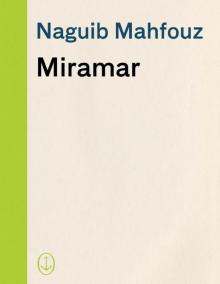 Miramar
Miramar The Mummy Awakens
The Mummy Awakens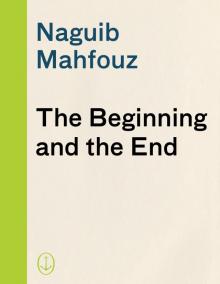 The Beginning and the End
The Beginning and the End Respected Sir, Wedding Song, the Search
Respected Sir, Wedding Song, the Search The Mirage
The Mirage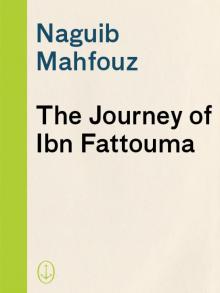 Novels by Naguib Mahfouz
Novels by Naguib Mahfouz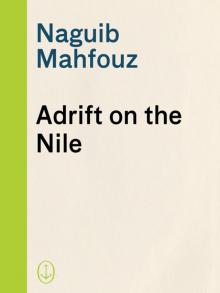 Adrift on the Nile
Adrift on the Nile Karnak Café
Karnak Café Heart of the Night
Heart of the Night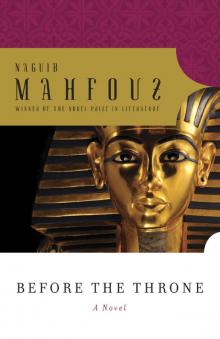 Before the Throne
Before the Throne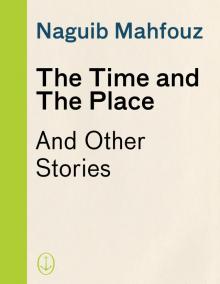 The Time and the Place: And Other Stories
The Time and the Place: And Other Stories Cairo Modern
Cairo Modern Arabian Nights and Days
Arabian Nights and Days The Day the Leader Was Killed
The Day the Leader Was Killed Morning and Evening Talk
Morning and Evening Talk Three Novels of Ancient Egypt Khufu's Wisdom
Three Novels of Ancient Egypt Khufu's Wisdom Akhenaten: Dweller in Truth
Akhenaten: Dweller in Truth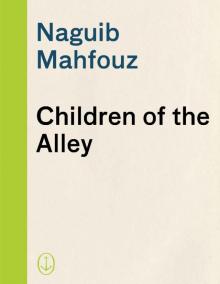 Children of the Alley
Children of the Alley Voices From the Other World
Voices From the Other World The Harafish
The Harafish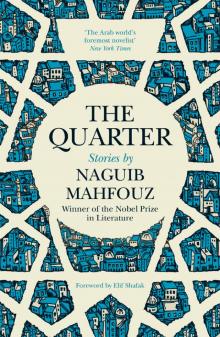 The Quarter
The Quarter The Seventh Heaven: Supernatural Tales
The Seventh Heaven: Supernatural Tales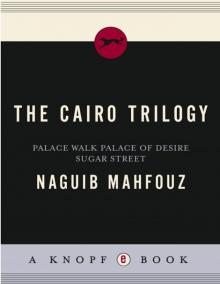 The Cairo Trilogy: Palace Walk, Palace of Desire, Sugar Street
The Cairo Trilogy: Palace Walk, Palace of Desire, Sugar Street Khan Al-Khalili
Khan Al-Khalili Three Novels of Ancient Egypt Khufu's Wisdom, Rhadopis of Nubia, Thebes at War
Three Novels of Ancient Egypt Khufu's Wisdom, Rhadopis of Nubia, Thebes at War Three Novels of Ancient Egypt
Three Novels of Ancient Egypt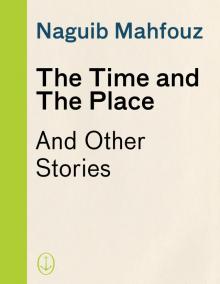 The Time and the Place
The Time and the Place Palace Walk tct-1
Palace Walk tct-1 Akhenaten
Akhenaten The Seventh Heaven
The Seventh Heaven The Thief and the Dogs
The Thief and the Dogs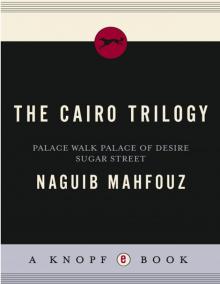 The Cairo Trilogy
The Cairo Trilogy Sugar Street tct-3
Sugar Street tct-3 Palace of Desire tct-2
Palace of Desire tct-2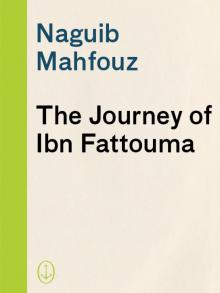 The Journey of Ibn Fattouma
The Journey of Ibn Fattouma